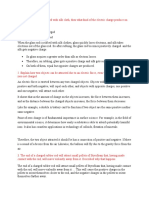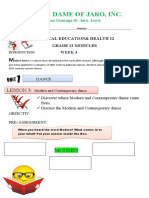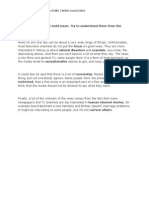0 ratings0% found this document useful (0 votes)
592 viewsTinikling
Tinikling
Uploaded by
Joy Angelique JavierTinikling is a Philippine dance performed between two bamboo poles that are tapped on the ground and against each other in coordination with dancers' steps. The kalapati depicts courtship movements of doves. Cariñosa is a Hispanic-influenced dance involving fans or handkerchiefs. The Maglalatik is a mock war dance depicting a coconut meat battle. Pandanggo sa Ilaw balances three oil lamps while dancing.
Copyright:
© All Rights Reserved
Available Formats
Download as DOCX, PDF, TXT or read online from Scribd
Tinikling
Tinikling
Uploaded by
Joy Angelique Javier0 ratings0% found this document useful (0 votes)
592 views4 pagesTinikling is a Philippine dance performed between two bamboo poles that are tapped on the ground and against each other in coordination with dancers' steps. The kalapati depicts courtship movements of doves. Cariñosa is a Hispanic-influenced dance involving fans or handkerchiefs. The Maglalatik is a mock war dance depicting a coconut meat battle. Pandanggo sa Ilaw balances three oil lamps while dancing.
Original Description:
different kinds of dances
Copyright
© © All Rights Reserved
Available Formats
DOCX, PDF, TXT or read online from Scribd
Share this document
Did you find this document useful?
Is this content inappropriate?
Tinikling is a Philippine dance performed between two bamboo poles that are tapped on the ground and against each other in coordination with dancers' steps. The kalapati depicts courtship movements of doves. Cariñosa is a Hispanic-influenced dance involving fans or handkerchiefs. The Maglalatik is a mock war dance depicting a coconut meat battle. Pandanggo sa Ilaw balances three oil lamps while dancing.
Copyright:
© All Rights Reserved
Available Formats
Download as DOCX, PDF, TXT or read online from Scribd
Download as docx, pdf, or txt
0 ratings0% found this document useful (0 votes)
592 views4 pagesTinikling
Tinikling
Uploaded by
Joy Angelique JavierTinikling is a Philippine dance performed between two bamboo poles that are tapped on the ground and against each other in coordination with dancers' steps. The kalapati depicts courtship movements of doves. Cariñosa is a Hispanic-influenced dance involving fans or handkerchiefs. The Maglalatik is a mock war dance depicting a coconut meat battle. Pandanggo sa Ilaw balances three oil lamps while dancing.
Copyright:
© All Rights Reserved
Available Formats
Download as DOCX, PDF, TXT or read online from Scribd
Download as docx, pdf, or txt
You are on page 1of 4
Tinikling is a pre-Spanish dance from the Philippines
that involves two people beating, tapping, and sliding
bamboo poles on the ground and against each other
in coordination with one or more dancers who step
over and in between the poles in a dance.
The kalapati is a dancepatterned after the
characteristic movements of the doves as they court
bowing, billing, and cooing. Originating from
Cabugao, Ilocos Sur, this lovely courtship dance
depicts the typical traits of the Ilocanos simplicity,
naturalness, and shyness.
Cariosa meaning the loving or affectionate one) is
a Philippine dance of Hispanic origin from the Maria
Clara suite of Philippine folk dances, where
the fan or handkerchief plays an instrumental role as
it places the couple in romance scenario.
The Maglalatik is a mock war dance that depicts a
fight over coconut meat, a highly-prized food. The
dance is broken into four parts: two devoted to the
battle and two devoted to reconciling. The men of the
dance wear coconut shells as part of their costumes,
and they slap them in rhythm with the music.
The Pandanggo sa Ilaw is similar to a Spanish
Fandango, but the Pandanggo is performed while
balancing three oil lamps - one on the head, and one
in each hand. It's a lively dance that originated on
Lubang Island. The music is in 3/4 time and is usually
accompanied by castanets.
precision acrobatic elements. It is defined by its
athletic character, its unique choreography, which
seamlessly blends dance and acrobatics, and its use
of acrobatics in a dance context.[1] It is a popular
dance style in amateur competitive dance as well as
in professional dance theater and in contemporary
circus
Salsa is a popular form of social dance that originated
in New York with strong influences from Latin
America, particularly Cuba and Puerto Rico. The
movements of salsa have its origins in Cuban
Son,Cha cha cha, Mambo and other dance forms,
and the dance, along with the salsa music
Ribbon Dance is a kind of a gymnastic dance. It is
also a component of rhythmic gymnastics composed
of a handle (called "stick"), a ribbon, and attachment.
Ballet is a type of dance. It is only done by dancers
who have had special training. The dancers are
employed by a dance company, and they perform
in theatres. The first reference to ballet is found in a
work of Domenico da Piacenza, who lived in the
early 14th century.
Acro dance is a style of dance that
combines classical dance technique with
Ballroom dance is a set of partner dances, which are
enjoyed both socially and competitively around the
world, and growing all the more popular in North
America. Because of its performance and
entertainment aspects, ballroom dance is also widely
enjoyed on stage, film, and television.
Tap dance is a form of dance characterized by using
the sounds of tap shoes striking the floor as a form of
percussion. Two major variations on tap dance exist:
rhythm (jazz) tap and Broadway tap. Broadway tap
focuses on dance; it is widely performed in musical
theater. Rhythm tap focuses on musicality, and
practitioners consider themselves to be a part of
the Jazz tradition.
Cha-cha-cha may be danced to authentic Cuban
music, or to Latin Pop or Latin Rock. The music for
the international ballroom cha-cha-cha is energetic
and with a steady beat. The Cuban cha-chach is more sensual and may involve
complex polyrhythms.
Jazz dance is a classification shared by
a broad range of dance styles. Before the 1950s, jazz
dance referred to dance styles that originated from
African American vernacular dance. In the 1950s, a
new genre of jazz dance modern jazz dance
emerged, with roots in Caribbean traditional dance.
Hip-hop dance refers to street dance styles primarily
performed to hip-hop music or that have evolved as
part of hip-hop culture. It includes a wide range of
styles primarily breaking, locking, and popping which
were created in the 1970s and made popular
by dance crews in the United States.
The waltz is a smooth,
progressive ballroom and folk dance, normally
in triple time, performed primarily in closed position.
Micheal Jackson
Lady Gaga
You might also like
- 456029-Character Sheet ROGUE EDITABLEDocument1 page456029-Character Sheet ROGUE EDITABLEJarad Kendrick100% (2)
- Feasibility Survey QuestionnaireDocument2 pagesFeasibility Survey QuestionnaireJoy Angelique Javier78% (32)
- Feasibility Survey QuestionnaireDocument2 pagesFeasibility Survey QuestionnaireJoy Angelique Javier60% (15)
- INST 1-De Vera Mark L. Activity#4Document4 pagesINST 1-De Vera Mark L. Activity#4shopeefindsph1822No ratings yet
- Film Production Lecture Notes PDFDocument12 pagesFilm Production Lecture Notes PDFAlbaSanchezVelazquez25% (4)
- Disaster Risk Reduction and ManagementDocument13 pagesDisaster Risk Reduction and ManagementKin LeeNo ratings yet
- Chapter 5: Environmental Awareness and Protection: Learning ObjectivesDocument20 pagesChapter 5: Environmental Awareness and Protection: Learning ObjectivesKhrestine ElejidoNo ratings yet
- TFN Transes M1 M7Document100 pagesTFN Transes M1 M7Kath SolitarioNo ratings yet
- Differences of PFRS For SMEsDocument4 pagesDifferences of PFRS For SMEsJoy Angelique Javier100% (2)
- Chapter 01 - AnswerDocument18 pagesChapter 01 - AnswerJoy Angelique JavierNo ratings yet
- MicroeconomicsDocument1 pageMicroeconomicsJoy Angelique JavierNo ratings yet
- Camel Up - Help SheetDocument1 pageCamel Up - Help SheetSaúl HdezNo ratings yet
- A Winners Guide To CasinoDocument9 pagesA Winners Guide To Casinokerex1320% (1)
- PE12Document6 pagesPE12asdNo ratings yet
- 2013 Bohol EarthquakeDocument11 pages2013 Bohol EarthquakeMonday VerdejoNo ratings yet
- DRRRDocument2 pagesDRRRJoyce Dela Rama JulianoNo ratings yet
- 5 Gamaba-Awardees of All TimeDocument9 pages5 Gamaba-Awardees of All TimeRic Ric100% (1)
- Chapter 6Document7 pagesChapter 6Arhann Anthony Almachar AdriaticoNo ratings yet
- Post Disaster Rehabilitation and Recovery PDFDocument14 pagesPost Disaster Rehabilitation and Recovery PDFYe Khaung100% (1)
- Chapter 11 - Climate Change, Energy Crisis and Environmental AwarenessDocument2 pagesChapter 11 - Climate Change, Energy Crisis and Environmental AwarenessKristine MorillaNo ratings yet
- NSTP Common Module 3 - Disaster Awareness, Preparedness, and MangementDocument45 pagesNSTP Common Module 3 - Disaster Awareness, Preparedness, and MangementClarisse BenedictoNo ratings yet
- 1 Module I Basic Concept of Disaster and Disaster RiskDocument31 pages1 Module I Basic Concept of Disaster and Disaster Riskjo anne mateo manrique100% (1)
- 1920 Module 6 DRRMDocument11 pages1920 Module 6 DRRMAlthea ValenzuelaNo ratings yet
- Gamaba AwardeesDocument1 pageGamaba AwardeesSweet LavenderNo ratings yet
- Poverty - Reaction Paper...Document1 pagePoverty - Reaction Paper...Xela Mae BigorniaNo ratings yet
- Disaster Preparedness For Family (Philippines)Document21 pagesDisaster Preparedness For Family (Philippines)Teofisto Gaal100% (1)
- Group 1 STSDocument10 pagesGroup 1 STSAstherielle MontefalcoNo ratings yet
- (LAS No. 2) Art Appreciation - Creativity, Imagination, and ExpressionDocument4 pages(LAS No. 2) Art Appreciation - Creativity, Imagination, and ExpressionCharl Roduard Valdez MacaraegNo ratings yet
- Male Physical and Sexual Changes: Happening To An IndividualDocument2 pagesMale Physical and Sexual Changes: Happening To An IndividualMarian Licuasen Ab-aboNo ratings yet
- Jama Mapun Ethnocology PDFDocument32 pagesJama Mapun Ethnocology PDFJason DimituiNo ratings yet
- Contemporary Philippine Arts From The Regions 1st QuarterDocument9 pagesContemporary Philippine Arts From The Regions 1st QuarterEllymar DuqueNo ratings yet
- NegritosDocument9 pagesNegritosJero DaclanNo ratings yet
- The Philippine Disaster Management SystemDocument3 pagesThe Philippine Disaster Management SystemJohn Cleeven Buensuceso Garcia100% (2)
- Module 1 Culture ArtsDocument6 pagesModule 1 Culture ArtsJme2 BarramedaNo ratings yet
- Course Unit - Human Flourishing in Science and TechnologyDocument5 pagesCourse Unit - Human Flourishing in Science and TechnologyJoseph Lleno EusebioNo ratings yet
- Disaster Awareness, Preparedness, and ManagementDocument5 pagesDisaster Awareness, Preparedness, and ManagementTea AnnNo ratings yet
- PDRRM ActDocument21 pagesPDRRM Actgene boy pitosNo ratings yet
- Disaster RiskDocument20 pagesDisaster RiskMariane Orola CaduyacNo ratings yet
- Disaster Awareness, Preparedness & M, AnagementDocument16 pagesDisaster Awareness, Preparedness & M, Anagementrmm0415No ratings yet
- National Museum of The PhilippinesDocument3 pagesNational Museum of The PhilippinesSunshine ArceoNo ratings yet
- Disaster Reduction and Risk ManagementDocument16 pagesDisaster Reduction and Risk ManagementDom-z100% (3)
- Jojo AssignmentDocument2 pagesJojo Assignmentherbert rebloraNo ratings yet
- Village of The WatermillsDocument1 pageVillage of The WatermillsSuvanah Marie MuñezNo ratings yet
- Cagayan State University: in Partial Fulfilment For The Requirements of The CourseDocument22 pagesCagayan State University: in Partial Fulfilment For The Requirements of The CourseFrendick LegaspiNo ratings yet
- NSTP2 MODULE 1 Community Development 3Document6 pagesNSTP2 MODULE 1 Community Development 3Elain RagosNo ratings yet
- PE1 Lesson2 Activities TemplateDocument4 pagesPE1 Lesson2 Activities TemplatehaeNo ratings yet
- Seeley - Urinary System PDFDocument36 pagesSeeley - Urinary System PDFSairelle Sordilla ObangNo ratings yet
- Global F O O D Security: Contemporary WorldDocument27 pagesGlobal F O O D Security: Contemporary WorldRose Belle A. GarciaNo ratings yet
- Disaster Risk Reduction and ManagementDocument25 pagesDisaster Risk Reduction and ManagementGelo DeoferioNo ratings yet
- Activity Sheet 2 in Disaster Readiness and Risk ReductionDocument3 pagesActivity Sheet 2 in Disaster Readiness and Risk ReductionSam Kim 3100% (1)
- Disaster Risk Reduction Management AwarenessDocument23 pagesDisaster Risk Reduction Management AwarenessPj ConcioNo ratings yet
- 2 Exposure and VulnerabilityDocument21 pages2 Exposure and VulnerabilityWendy Dela CruzNo ratings yet
- Alice ReyesDocument1 pageAlice ReyesAdrian Maranan100% (1)
- Disasters and HazardsDocument23 pagesDisasters and HazardsMaverick Banaag100% (1)
- Essay On Disaster Month CelebrationDocument3 pagesEssay On Disaster Month CelebrationMaria Josephine V. LimNo ratings yet
- Activity For Lesson 1 DRRRDocument4 pagesActivity For Lesson 1 DRRRperlyn oduya25No ratings yet
- Chapter 2 Physical VulnerabilityDocument21 pagesChapter 2 Physical VulnerabilityallanrnmanalotoNo ratings yet
- Handouts in DRRRDocument17 pagesHandouts in DRRRGiea Gay SeverinoNo ratings yet
- G11 Understanding Hydrometeorological Hazard MapsDocument5 pagesG11 Understanding Hydrometeorological Hazard MapsJose JeramieNo ratings yet
- Worktext in Electromagnetism For Teachers 4Document8 pagesWorktext in Electromagnetism For Teachers 4Xein BangNo ratings yet
- DRR HandoutDocument175 pagesDRR HandoutBjBeloyNo ratings yet
- Types of DisastersDocument11 pagesTypes of DisastersKimberly Sheen Medina YamsonNo ratings yet
- DRRR Module 9 DISASTER RISK REDUCTION AND MANAGEMENTDocument18 pagesDRRR Module 9 DISASTER RISK REDUCTION AND MANAGEMENTManases Nazareta50% (2)
- Course OutlineDocument1 pageCourse OutlineMarkChristianRobleAlmazanNo ratings yet
- DRRRDocument20 pagesDRRRKiara Denise SuarezNo ratings yet
- Bukas Na Lata: Scale and ProportionDocument1 pageBukas Na Lata: Scale and ProportionKim AmadorNo ratings yet
- Reaction Paper Super Typhoon YolandaDocument3 pagesReaction Paper Super Typhoon YolandaDPDA DPDONo ratings yet
- DANCEDocument21 pagesDANCEMILDRED RODRIGUEZNo ratings yet
- Hip Hop: Cultural Origins Typical Instruments Derivative FormsDocument10 pagesHip Hop: Cultural Origins Typical Instruments Derivative FormsJoan MeloNo ratings yet
- LP NMDocument2 pagesLP NMJoy Angelique JavierNo ratings yet
- Project in ArtsDocument23 pagesProject in ArtsJoy Angelique JavierNo ratings yet
- Project - in ScienceDocument41 pagesProject - in ScienceJoy Angelique JavierNo ratings yet
- Rosa L. Susano - Novaliches Elementary School S.Y. 2018 - 2019Document13 pagesRosa L. Susano - Novaliches Elementary School S.Y. 2018 - 2019Joy Angelique Javier100% (1)
- Project in MusicDocument14 pagesProject in MusicJoy Angelique JavierNo ratings yet
- K To 12 CurriculumDocument34 pagesK To 12 CurriculumJoy Angelique JavierNo ratings yet
- TLE-Test-6 First Quarter 2017Document3 pagesTLE-Test-6 First Quarter 2017Joy Angelique JavierNo ratings yet
- Chart Food Preservation Sample RecipesDocument2 pagesChart Food Preservation Sample RecipesJoy Angelique Javier100% (4)
- Food Preservation ChartDocument2 pagesFood Preservation ChartJoy Angelique Javier89% (9)
- Chapter 7-Competition and Policies Towards Monopolies and Oligopolies, Privatization and Deregulation CompetitionDocument5 pagesChapter 7-Competition and Policies Towards Monopolies and Oligopolies, Privatization and Deregulation CompetitionJoy Angelique JavierNo ratings yet
- Grace SalesDocument10 pagesGrace SalesJoy Angelique JavierNo ratings yet
- Purchasing DocumentsDocument7 pagesPurchasing DocumentsJoy Angelique JavierNo ratings yet
- Net Sales: ABACA Trading Income Statement For The Year Ended December 31Document4 pagesNet Sales: ABACA Trading Income Statement For The Year Ended December 31Joy Angelique JavierNo ratings yet
- Les Brown: Unknown UnknownDocument4 pagesLes Brown: Unknown UnknownJoy Angelique JavierNo ratings yet
- Horizontal Balance SheetDocument4 pagesHorizontal Balance SheetJoy Angelique JavierNo ratings yet
- Stages in Business Communication: Stage 1-PrewritingDocument5 pagesStages in Business Communication: Stage 1-PrewritingJoy Angelique JavierNo ratings yet
- Philosophy of Nature: Infinitum, But Are Not Actually So DividedDocument1 pagePhilosophy of Nature: Infinitum, But Are Not Actually So DividedJoy Angelique JavierNo ratings yet
- Book Bingo HandoutsDocument2 pagesBook Bingo HandoutsSCPL TeensNo ratings yet
- DANCEDocument8 pagesDANCEKimberly M SalvadorNo ratings yet
- 5e Revamped CompanionDocument1 page5e Revamped CompanionNKHICQ1mEbIw100% (1)
- Impact of Dancehall Music in The CaribbeanDocument1 pageImpact of Dancehall Music in The CaribbeanAnna-kaye James100% (4)
- Acting Resume Template 39Document1 pageActing Resume Template 39Julian RobertsonNo ratings yet
- Kick Off ScriptDocument4 pagesKick Off Scriptarnel tormisNo ratings yet
- Senior Product Marketing ManagerDocument3 pagesSenior Product Marketing Managerarunmars900No ratings yet
- James Sienkievic: 71 Village Road 720-299-7978 Brooklyn, NY 11223Document1 pageJames Sienkievic: 71 Village Road 720-299-7978 Brooklyn, NY 11223JamesSienkievicNo ratings yet
- LetterDocument2 pagesLetterapi-358748824No ratings yet
- DND - 1 AsDocument3 pagesDND - 1 AsPatrino PatrinoNo ratings yet
- People Media: Mr. Jeth J. Lungay Media and Information LiteracyDocument64 pagesPeople Media: Mr. Jeth J. Lungay Media and Information LiteracyDoy J JoyoNo ratings yet
- Norman Medoff and Edward J. Fink (Auth.) - Portable Video. News and Field Production (2012)Document380 pagesNorman Medoff and Edward J. Fink (Auth.) - Portable Video. News and Field Production (2012)Marliza binti Abdul Malik Faculty of Communication, Visual Art & ComputingNo ratings yet
- Street and Hiphop Dance StylesDocument42 pagesStreet and Hiphop Dance StylesBea MagsombolNo ratings yet
- SF Conservatory CirriculumDocument18 pagesSF Conservatory CirriculumScott FeichterNo ratings yet
- Hotel Restaurant TourismDocument4 pagesHotel Restaurant TourismAyu SetiyokoNo ratings yet
- Final Stand Up Comedy Clubs Research PaperDocument28 pagesFinal Stand Up Comedy Clubs Research PaperraselNo ratings yet
- Valerie Stack Dodge: TheatreDocument1 pageValerie Stack Dodge: Theatreapi-431926350No ratings yet
- Module For Arts 10 q4 1Document5 pagesModule For Arts 10 q4 1angelo gelo67% (3)
- PE and H Week 3Document5 pagesPE and H Week 3Via Terrado CañedaNo ratings yet
- Worksheet 2: Can / Can'tDocument1 pageWorksheet 2: Can / Can'tRaul Hijar Abarca0% (1)
- The Power of MediaDocument14 pagesThe Power of MediaAashik ThakurNo ratings yet
- My ResumeDocument1 pageMy Resumeapi-464842257No ratings yet
- News WorksheetsDocument2 pagesNews Worksheetsprajjwal.aricent4122No ratings yet
- 22 (Maid To Be Strong) - Page 2 - WattpadDocument13 pages22 (Maid To Be Strong) - Page 2 - Wattpadhyunfany143No ratings yet
- Music GenreDocument18 pagesMusic GenreGiemer HerreraNo ratings yet
- List of Accolades Received byDocument29 pagesList of Accolades Received byVillaErnestNo ratings yet















































































































